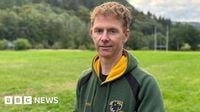Concerns are mounting across Wales as the Welsh Rugby Union’s (WRU) decision to cut its longstanding hub officer programme has sent shockwaves through grassroots clubs, schools, and communities. The programme, launched in 2014, placed dedicated officers in schools and colleges, aiming to nurture the next generation of rugby talent by introducing the sport to young people—especially in rural and hard-to-reach areas. Now, as the WRU moves to restructure and save £5 million, many in the rugby community fear the very foundation of Welsh rugby is at risk.
“It’s been vital for us,” said Tudur Roberts, coach of Nant Conwy Rugby Club’s under-16s girls team in Llanrwst, Conwy County. “We’ve had some teams struggling to get players and then Ifan, our local hub officer, would be in schools promoting rugby and pushing them to come to us. Every month he’d bring one or two new players to us.” Roberts’ sentiment is echoed by coaches and parents across the country, who credit the hub officers with keeping clubs alive by feeding in new players—often from far-flung communities where rugby is not always the first sport of choice.
The timing of the cuts could hardly be more fraught. Alongside the withdrawal of hub officers, the WRU has announced plans to reduce the number of professional regions to two, a move that has created widespread uncertainty for Wales’ professional clubs and heightened anxiety about the future of the game at all levels. “It’s going to be really tough. I don’t know where we go from here... they [the WRU] don’t seem to understand that grassroots is where the players come from,” Roberts lamented. “That shows through the girls we’ve sent through to Wales. If there are no hub officers to start them on their way, then we’re going to be struggling for players, and in turn, so will the national team.”
The impact of the hub officer cuts is felt most acutely in rural areas, where geography poses a significant barrier to participation. Nant Conwy Rugby Club, for instance, sits in a picturesque but isolated valley where some girls face up to a 25-mile (40 km) trip just to attend practice. For these communities, having a hub officer who can bring rugby directly into schools is nothing short of essential. “We are a very rural valley, and many girls don’t engage with rugby. It can be a 25-mile trip for their parents to bring them here and so being able to take rugby to the schools through the hub officers is fundamental really to that development,” said club member Elaine Jones.
The club, which is celebrating its 45th anniversary this year, is not taking the changes lying down. In a show of determination and community spirit, members have launched a fundraising campaign to keep their local hub officer, challenging themselves to walk 45 miles in one day. “Everyone’s behind it, we all want to keep our hub officer,” Jones explained. “Without the hub officer our under-eights and under-10s wouldn’t have had enough players, so we know how important they are.” Yet, the necessity of such efforts is tinged with sadness. “It shouldn’t be happening, but it is where we are, and we’ve just got to make the best of it,” Jones added, reflecting a widespread frustration that clubs are having to fill the gaps left by national restructuring.
The voices of the young players themselves are perhaps the most poignant. Thirteen-year-old Ela, a Nant Conwy player, shared her excitement about the upcoming Women’s Rugby World Cup and the pride she feels seeing four former clubmates—Nel and Branwen Metcalfe, and Gwenllïan and Alaw Pyrs—don the Wales jersey. “We’re all really excited to watch Branwen, Nel, Alaw and Gwenllïan. We really look up to them as a club and as a team as well,” Ela said. But she also recognizes what’s at stake: “I think the hub officer we had last year was very important because he did a lot of things with us and gave us lots more opportunities in school, and to play against other schools. I think it’s going to be a big loss.” Her teammate Elsie echoed the concern: “They do so much work, I don’t know why they’re being cut by the WRU. They’ve brought so many more girls to play here. I’m not sure what will happen without them.”
As Wales prepares to kick off its Women’s Rugby World Cup campaign against Scotland in Salford this Saturday, the achievements of Nant Conwy’s “fantastic four” serve as a powerful reminder of what’s possible when grassroots pathways are strong and supported. The club’s legacy is tangible—four homegrown players now representing their country on the world stage. But for many, the fear is that such stories will become rarer if the pipeline dries up.
Amid the criticism, WRU community director Geraint John has defended the restructuring, insisting that the new programme will ultimately serve Welsh rugby better. “WRU staff will be reorganised and their number increased with a much wider remit to ensure all community clubs and educational establishments across Wales have a named contact and a consistent level of support,” John said. He acknowledged that the organisation had to “relook at our finances and reshape the department,” but emphasized that the programme had been “reshaped rather than cut.” According to John, the new rugby engagement officers will cover more areas, supporting not just player recruitment but also coaching, refereeing, and club funding. More than 200 people have reportedly applied for these new roles.
Still, questions remain about whether the new approach will be enough to maintain—and grow—participation, especially among girls and in rural communities. John admitted, “It’s too early to know if fewer children would move from schools to clubs, but the WRU would monitor numbers and make changes if needed.” He also highlighted that women’s rugby is “vitally important,” with new applications for hubs to grow the girls’ game set to open soon.
For now, clubs like Nant Conwy are left to navigate the uncertainty, relying on community grit and creativity to keep their dreams alive. The stakes are high—not just for the next World Cup, but for the future of Welsh rugby itself. As the action gets underway in Salford, the eyes of a proud rugby nation will be watching, hoping that the grassroots spirit that built Welsh rugby can weather this latest storm.




